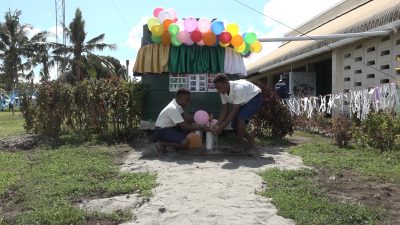West Guadalcanal Communities benefit from TC Harold WASH Recovery Project
A total of 490 households with 4,134 people from 8 communities in Northwest and West Guadalcanal now have access to piped water under the “West Guadalcanal Tropical Cyclone Harold WASH Recovery Project”.

Two Selwyn College students smiling away as they wash their hands at one of the 8 water tanks donated to the school.
Seven communities were rehabilitated with water supply infrastructure and rainwater catchments for Selwyn College.
The Project was funded by the Australian Government, and implemented by the United Nation Development Program (UNDP) in partnership with the Ministry of Environment, Climate Change and Disaster Management (MECDM) and Guadalcanal Provincial Government.
Handing over ceremony today at the Divit Rural Training Center compound in Visale, Northwest Guadalcanal, Deputy High Commissioner of the Australian High Commission office Ms Sally-Anne Vincent said this is not the first time for Australia to support the country in terms of water and sanitation.
“The Australian government has been supporting disaster risk reduction, health education and water and sanitation for many years and we will continue to do so in partnership with the national and provincial government, National Disaster Management Office (NDMO) and UNDP.
“We are very pleased to stand behind the work that has been going on and continue to support that,” Deputy High Commissioner Ms. Sally-Anne Vincent said.
On 3rd of April 2020, category 2 Tropical Cyclone (TC) Harold had affected the Solomon Islands.
Approximately 71, 017 people were estimated by NDMO to have been affected.
Based on TC Harold track, a large number of damages to houses and food gardens were reported west of Guadalcanal Province.
Sectors identified by the initial damage assessment led by NDMO to be most in need of assistance were repair of water sources, livelihood, and shelter.
Guadalcanal provincial administration provided the lead role in liaison with the Rural Water Sanitation and Hygiene programme of the Ministry of Health and Medical Services and the seven communities in west Guadalcanal.
In his keynote address Guadalcanal Province’ Premier Hon. Francis Sade thanked the Australian Government for its support to the country during times of need.
Premier Sade also stressed that rural health and sanitation is among his government’s priority areas to consider as it is captured in their Strategic Policy for 2019 – 2023.
“Deputy High Commissioner, Ms. Sally Vincent, on behalf of the people of Guadalcanal, thank you so much for your genuine support.

Deputy High Commissioner Ms Sally-Anne Vincent shake hands with a Nun of Divit community infront of a newly built tap.
“In general, thank you so much for your tremendous financial and technical support in the aftermath of TC Harold.
“Since taking office in 2019, my Executive Government is doing its best to prioritize its obligatory services in regards to rural health and sanitation. Our Strategic Policy for 2019 – 2023 also captured these,” Premier Sade said.
The Premier also appeals to the recipients to take ownership of these projects.
“I would like to appeal to all the 490 households or the 4134 individual beneficiaries to take ownership of all these 8 projects.
“Such support is not easy to come by. We’re so fortunate that development partners such as UNDP and the Australian Government, and also our relevant mother ministries to reach out to us.
“Thus, the responsibilities to take ownership of these projects are now on your shoulders,” he appealed.
Speaking on behalf of the recipient communities, Selwyn College School Principal Fr. Davidson Ngwaeramo said the installation of the water taps and tanks to their communities is a blessing.
“The experience that we had after Tropical Cyclone Harold was we had to walk and search for drinking water from nearby villages and communities.
“For us Selwyn College, with the assistance of eight large water tanks from UNDP will give us access to drinking water,” Fr Ngwaeramo said.
Some communities used to walk up to 500 meters to 1.5 kilometers to fetch water and this has been now reduced to 3-10 meters.
Women and children who normally walked the distance to collect water now have more time to do other chores.
For sustainability of water supply infrastructure, basic maintenance training was provided to 90 people from those seven wards at the end of WASH recovery activity.
by Simon Tavake



